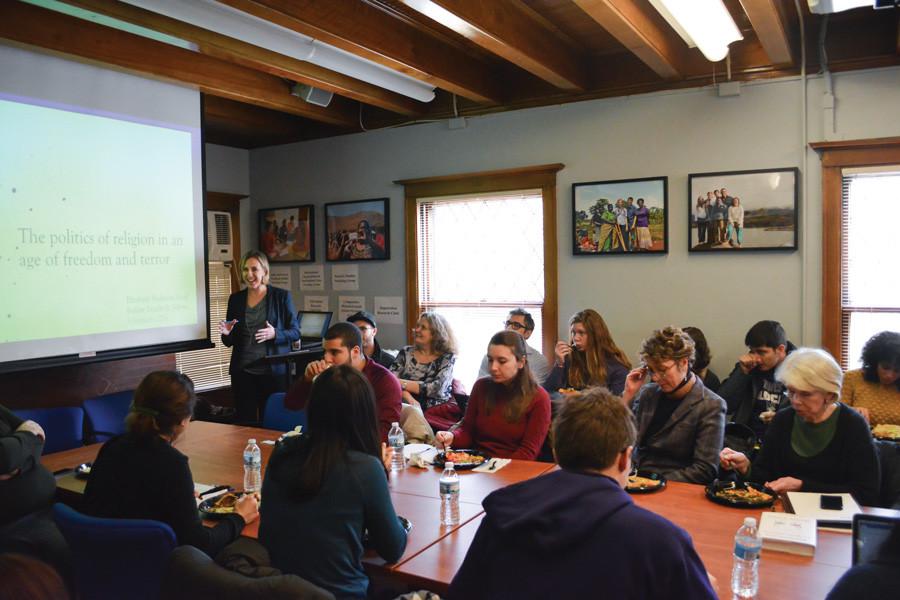Northwestern professor talks pitfalls of counter-extremism efforts
Aleah Meta/The Daily Northwestern
Political science prof. Elizabeth Shakman Hurd discusses violent extremism and religious freedom at the Buffett Institute. About 90 people gathered to hear her speak Friday as part of the Buffett Institute Faculty and Fellows Colloquium.
February 7, 2016
Political science Prof. Elizabeth Shakman Hurd critiqued governments’ efforts to counter violent extremism, finding their limitations can often provoke the radicalization they are trying to prevent.
About 90 members of the Northwestern community gathered Friday afternoon to hear Hurd, who is also the director of the Buffett Institute for Global Studies’ Global Politics and Religion Research Group.
Countering Violent Extremism programs are defined by the Department of Homeland Security as agendas to encourage people to demand their religious rights and freedoms, but in a way that governs religion to conform to state interests, Hurd said.
The programs essentially can serve as political and legal strategies for controlling people’s religious lives, she added. Hurd agreed with the view that a government’s confining and scrutinizing of communities’ religious beliefs may lead to its producing the “violent extremists” it is trying to prevent.
“CVE and religious freedom programs distract from efforts to address real and complex causes of violence as well as discrimination at home and abroad,” Hurd said. “Religious reformation, religious emancipation, toleration becomes the solution — becomes the only thinkable solution.”
Hurd said using the term religious violence to describe conflict in many parts of the world is inaccurate. There may be religion-fueled violence in these areas, she said, but religion is embedded in very complex ways in laws and social institutions. People can’t use the word “religious” as a way to categorize or explain violence, Hurd said.
In a discussion following the talk, Hurd addressed what other work is being done to reform CVE programs, such as the European Union recently advocating for religious freedom in a manner that does not impose concepts of religion on foreigners.
Hurd also clarified there is no way to identify a bad ideology without examining the specifics and context of a situation.
“We can’t speak in abstract terms of ‘how do we fight them,’ without understanding who ‘we’ are and who ‘they’ are,” Hurd said.
Hurd’s talk was part of a series of weekly meetings for the Buffett Institute Faculty & Fellows Colloquium, in which primarily scholars, faculty and graduate students come to the Buffett Institute to learn about a faculty member’s research, Hurd told The Daily. The talk was also based on the issues raised in her new book, “Beyond Religious Freedom: The New Global Politics of Religion.”
Ph.D. student Aymeric Punel said these talks encourage people to consider alternatives to global policies and programs by providing an in-depth perspective that is not easily found on the Internet or on TV.
“I came (to the event) because I like to be open-minded,” Punel said. “When you are in your studies, it’s sometimes easy to forget what is happening in the world, and that should not be the case.”
Weinberg junior Tara Mittelberg said it’s easy to hear the terms “countering violent extremism” and “religious freedom” and view them as strictly beneficial programs.
“It’s refreshing to hear somebody call out this kind of two-sided issue,” Mittelberg said. “A lot of times there’s a clear ‘yes” or ‘no’ and there’s no conversation in the middle. But I think (Hurd) really encouraged conversation in the middle.”
Email: [email protected]
Twitter: @rdugyala822


